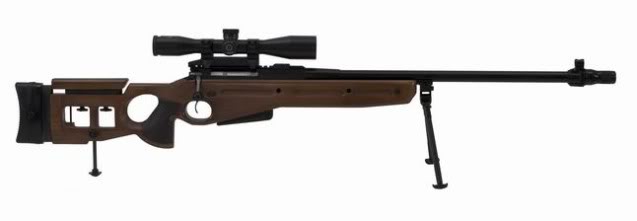SSG-04
http://world.guns.ru/sniper/sniper-rifles/at/steyr-ssg-04-e.html
 Re: Russian Sniper Rifles
Re: Russian Sniper Rifles Re: Russian Sniper Rifles
Re: Russian Sniper Rifles Re: Russian Sniper Rifles
Re: Russian Sniper Rifles Re: Russian Sniper Rifles
Re: Russian Sniper Rifles Re: Russian Sniper Rifles
Re: Russian Sniper Rifles Re: Russian Sniper Rifles
Re: Russian Sniper Rifles Re: Russian Sniper Rifles
Re: Russian Sniper Rifles

 Re: Russian Sniper Rifles
Re: Russian Sniper Rifles Re: Russian Sniper Rifles
Re: Russian Sniper Rifles Re: Russian Sniper Rifles
Re: Russian Sniper RiflesTheArmenian wrote:The SV-98 is already in service in the Armenian Army. Some front line units (from special forces) use it.


 Re: Russian Sniper Rifles
Re: Russian Sniper RiflesCyberspec wrote:TheArmenian wrote:The SV-98 is already in service in the Armenian Army. Some front line units (from special forces) use it.
Interesting. I didn't know...and thanks for the pics.
As per Garry's requestthe new SV-338M firing the .338 Lapua Magnum round


It's one of the candidates (domestic and foreign) for the new Russian sniper rifle
 Re: Russian Sniper Rifles
Re: Russian Sniper Rifles Re: Russian Sniper Rifles
Re: Russian Sniper Rifles
 Re: Russian Sniper Rifles
Re: Russian Sniper Rifles
 Re: Russian Sniper Rifles
Re: Russian Sniper Rifles Re: Russian Sniper Rifles
Re: Russian Sniper Rifles Re: Russian Sniper Rifles
Re: Russian Sniper Rifles


 Re: Russian Sniper Rifles
Re: Russian Sniper Rifles Re: Russian Sniper Rifles
Re: Russian Sniper Rifles Re: Russian Sniper Rifles
Re: Russian Sniper Rifles Re: Russian Sniper Rifles
Re: Russian Sniper Rifles Re: Russian Sniper Rifles
Re: Russian Sniper RiflesGarryB wrote:Give them a break... it is like UAVs... their primary customer (the Russian military) only paid lip service before 8 8 8 to UAVs, now they demand world class products.
Currently the leaders in UAV technology would be the US and Israel and neither of those countries developed their expertise in 3 years... it has actually been more like 30.
It is the same with long range shooting, though many of the details and skills are actually practised in the Russian military... but not with rifles... in artillery units.
The Russians have small companies that specialise in accurate and quality firearms, and considering the conditions they need to operate in reliability is already built in.
Civilian Russian shooters have their share of world medals, but the focus now will be more western oriented... don't know if that is a good thing or not... Soviet training was for 600-800m engagements with SVDs and western experience in Afghanistan has resulted in the introduction of SVD like semi automatic designated marksmen rifles within platoons... just like Soviet practise.
If they have chosen the right model 338 Lapua Magnum round to adopt it can be effective out to 1,500m. Ammo like Chey Techs special rounds can more than double that range... but I think a bit of common sense needs to be applied... if you are needing to hit targets at 3km then something like Kornet is much heavier, but is also much more accurate and carries the HE punch to take out a whole room or ensure the destruction of even a well armoured vehicle or even an aircraft.
The Russian equivalent of western snipers are recon soldiers with the GRU (army intel) and would spend more time gathering information about the enemy than shooting officers or Scud missile launchers.
 Re: Russian Sniper Rifles
Re: Russian Sniper RiflesThis entirely depends on the military doctrine.
American generals were first against heavy sniper rifles.
But everything changed when Berret demostrated rifle capable of shooting down or disabling a helicopter with a round costing only several bucks.
Russians could do that with kornet ofcourse. But that might be considered too heavy and not that mobile.
You have compared this situation with the one on the UAV matter.
In my opinion this is inadequate.
All they need to do is built upon the experience which they have from these rifles. And these rifles have been, altough in small numbers, constantly used in Chechniya. Unlike UAVs where Russians had a big gap when they were last using REISS and today the newer UAVs.
But ultimatelly it comes down to the main point where i think they are already facing a problem of lack of skilled workforce that would be willing to work in manufacturing and military industry. But i guess thats another topic.
 Re: Russian Sniper Rifles
Re: Russian Sniper RiflesWhen UAVs were introduced... someone had to take on the risk.
Generals from anywhere are often against unproven new uses of weapons.
Unproven is risky and Generals don't like risk.
Large anti-material rifle like M107 can be operated by a single person with ammunition of several shots.
An Igla is much more mobile and have a much greater envelop for downing helos, and requires much less skill. Getting within about 1.5km of an enemy helo is not easy on foot.
50 cal rifles are more often used against ground targets... and out to an effective range of about 2km. A decent 50 cal rifle weighs about 10kgs. A single guy armed with a 50 cal rifle would never be sent alone into enemy territory or out onto the battlefield.
It is far more likely that a team of 5 to 10 soldiers might go on a mission to take out enemy assets.
Well the biggest part of the problem are not skills, but will to work like this. Young Russians don't want to work in manufacturing. They want to work in nice and clean offices.
ou can't buy a trained skilled workforce. That comes from experience in production and the fact that they have not produced anything in bulk for 20 years it is perfectly understandable.
 Re: Russian Sniper Rifles
Re: Russian Sniper Rifles